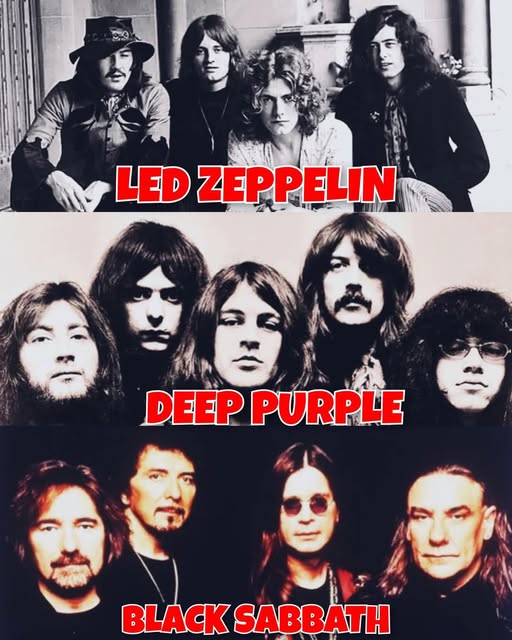
When it comes to the origins of hard rock and heavy metal, three names dominate the conversation: Black Sabbath, Deep Purple, and Led Zeppelin. Emerging from the late 1960s British rock scene, these bands pioneered a heavier, more aggressive sound that laid the foundation for decades of music to come. Together, they are often referred to as the Holy Trinity of hard rock and heavy metal.

Led Zeppelin: The Architects of Hard Rock Majesty
Formed in 1968, Led Zeppelin fused blues, folk, and psychedelic rock into something entirely new and monumental. Featuring Robert Plant’s powerful vocals, Jimmy Page’s genre-defining guitar riffs, John Paul Jones’ versatile musicianship, and John Bonham’s thunderous drumming, Zeppelin crafted a sound that was both raw and refined.
Their self-titled debut album “Led Zeppelin” (1969) set the tone with tracks like “Dazed and Confused” and “Communication Breakdown,” but it was later albums like “Led Zeppelin IV” (1971), featuring the immortal “Stairway to Heaven,” that showcased their range and ambition. Zeppelin brought mysticism, blues-rooted groove, and sonic depth to hard rock, influencing countless artists in their wake.
Black Sabbath: The Fathers of Heavy Metal
If Led Zeppelin was the sound of the gods, Black Sabbath was the sound of the underworld. Formed in Birmingham in 1968, Sabbath took the blues-based rock sound of the era and injected it with doom, gloom, and distortion. Tony Iommi’s crushing guitar riffs, born from necessity after a factory accident, became the blueprint for heavy metal guitar. Geezer Butler’s ominous bass lines, Bill Ward’s jazzy but hard-hitting drumming, and Ozzy Osbourne’s haunting vocals completed the apocalyptic quartet.
Their 1970 debut “Black Sabbath” opened with a rainstorm and a tritone riff that essentially gave birth to heavy metal. That same year, they released “Paranoid”, an album containing genre-defining tracks like “Iron Man,” “War Pigs,” and the titular “Paranoid.” Sabbath’s music tackled dark themes—war, insanity, the occult—with a heaviness never before heard. Their legacy is not just in their influence but in the genre they essentially created.
Deep Purple: The Virtuosos of Heavy Rock
Often more melodic and progressive than their contemporaries, Deep Purple brought technical mastery and a classically influenced edge to hard rock. With roots dating back to 1968, the band’s “Mark II” lineup—Ian Gillan, Ritchie Blackmore, Roger Glover, Jon Lord, and Ian Paice—would become iconic.
Their 1972 album “Machine Head” is a cornerstone of rock history, giving the world “Smoke on the Water,” one of the most famous riffs ever written. Deep Purple blended classical motifs, jazz flourishes, and heavy blues into a sound that was aggressive yet refined. Jon Lord’s pioneering use of the Hammond organ added a unique texture to their sound, setting them apart from their peers. With songs like “Highway Star” and “Child in Time,” the band demonstrated both speed and complexity that would influence early metal and later progressive metal movements.
Shared Legacy and Lasting Impact
Despite differences in tone and approach, these three bands shared a fierce originality and an unwillingness to conform to trends. While Zeppelin remained enigmatic and never officially reunited after John Bonham’s death, Deep Purple and Black Sabbath experienced multiple lineup changes, breakups, and comebacks—each reinforcing their legacy in new ways.
Together, they helped establish:
- The power of the riff: From Page’s “Whole Lotta Love” to Iommi’s “Sabbath Bloody Sabbath” to Blackmore’s “Smoke on the Water,” riffs became the core of heavy music.
- The importance of virtuosity: Each band pushed the boundaries of their instruments, laying the groundwork for generations of technical musicians.
- The formation of genres: Led Zeppelin shaped hard rock and early heavy metal, Black Sabbath laid the foundation for all metal subgenres, and Deep Purple bridged the gap between hard rock, prog, and proto-metal.
Conclusion
Black Sabbath, Deep Purple, and Led Zeppelin were more than just bands—they were pioneers. Their influence runs through the veins of virtually every rock and metal act that followed. Whether it’s the darkness of Sabbath, the grandeur of Zeppelin, or the virtuosity of Deep Purple, the Holy Trinity of hard rock continues to inspire and captivate audiences around the world. Their legacy isn’t just in the music they made, but in the millions of artists and fans they empowered to explore the loud, the heavy, and the epic.
Leave a Reply